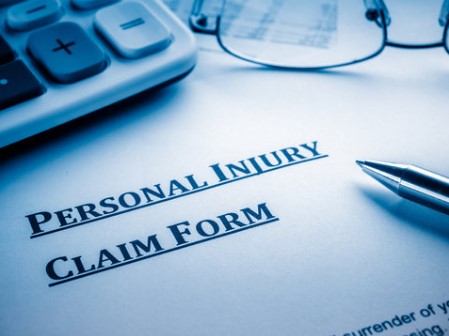Personal injury lawsuits are pivotal in every individual's life, especially for accident victims. Every year, at least 400,000 personal injury claims are filed, according to the Department of Justice's personal injury statistics. However, this number only includes injury cases and claims filed for pre-trial, settlement, and the plaintiff's lawsuit against the defendant.
Many cases go overlooked due to a lack of money and support to file a personal injury lawsuit. There is also a lack of knowledge and understanding about statutes of limitations, personal injury timelines, and the general law article in the United States. Above all, there is only a limited number of personal injury attorneys compared to the number of personal injury cases filed annually. This raises a reasonable question for every U.S. citizen: "How to file a personal injury claim without a lawyer?" You can file a personal injury claim and represent yourself without a personal injury attorney. However, a personal injury claim involves a lot of work — from gathering evidence to negotiating a settlement offer.
It is recommended to hire a personal injury lawyer as their services will greatly help with the demand and distress of filing a claim. Additionally, seeking the advice of a professional from a well-known law firm often results in settlement negotiations and agreements favorable to you. To learn how to file a personal injury claim without a lawyer, better understand how personal injury lawsuits work and what you should know if you decide to be your own representationThe way people with disabilities are depicted in media, culture, and politics, often influencing pub....
What Is A Personal Injury Lawsuit

Personal injury claims are legal claims made under the civil procedures of personal injury lawThe area of law that deals with compensating individuals who have been injured, including those with.... This means that if the claim is substantiated, a person who committed violence or physical injury to the other party could face substantial charges under state law. If the insurance company and the victim cannot agree on a settlement compensation amount, the victim may file a personal injury lawsuit. Personal injury lawsuits cover a wide range of cases, and the following is a list of some of the most common reasons why defendants file them:
Auto Accident
A car accident claim is quite common as an auto accident injury occurs every second in the United States. Records from the U.S. Department of Transportation's National Highway Administration show a 7.2% increase in road accidents since 2020, despite a decrease in people's travel. This is a clear statement that personal injury cases are increasing, and there are various types of car accidents, such as:
- Pedestrian accidents
- Motorcycle accidents
- Bicycle accidents
If you require assistance with vehicle accident claims, you should get help from an auto accident attorney.
Slip And Fall Accident
A slip and fall case can be filed without the assistance of a lawyer. You must prove that you were injured due to another party's negligence. You are eligible to get compensation from insurance companies as long as you do not exceed the time limits.
Medical Malpractice
According to John Hopkins School of Medicine research, medical malpractice kills between 250,000 and 400,000 Americans each year. Unnecessary surgery is thought to kill roughly 12,000 people each year. Up to 1,500,000 people suffer a nonfatal injury from a medical error annually.
Medical malpractice wreaks havoc on people's lives. This is just carelessness on the part of healthcare personnel, including doctors, nurses, and other healthcare employees. Most victims receive adequate compensation for the significant pain and suffering they experience due to medical misconduct.
In addition, a wide range of injury cases, such as workplace injuries, are occurring more frequently in the U.S.
Serious Injuries That Qualify You For A Personal Injury Claim
Injuries sustained in an accident do not automatically award you compensation. You may sue for damages only if you have suffered a "serious injury," as defined by a state's statute. A common example of a serious injury based on New York Consolidated Laws: Insurance (ISL) §5102(d), includes:
- Severe scarring or disfigurement
- Dismemberment
- Loss of a organ, limb, or other important bodily function
- Loss of use of a organ, limb, or other important bodily function
- Death
Even if you have not suffered any of these specific injuries, you may still be eligible for compensation and health insuranceA system for paying for medical services, often covering preventive, diagnostic, and treatment costs.... It is, however, your responsibility to demonstrate that your condition matches the definition of a serious injury. Medical evidence of your wounds and how you received treatment can be beneficial to your case.
Compensation You Are Eligible To Receive For Damages
Compensation is money given to an accident victim or their family as restitution for injuries or wages lost due to an accident. Without a lawyer, it is up to you to persuade an insurance adjuster or a jury in court that you are entitled to everything that you demand. The settlement amount you can reclaim is generally classified into three categories:
- Economic damages
- Non-economic damages
- Punitive damages
Economic Damages
Economic damages compensate for costs with a direct and easily quantifiable monetary value. The goal of economic damage compensation is to immediately replace the money that was or will be lost in the future. Common economic damages include:
- Medical Expenses. This applies to ongoing medical care fees and hospital bills incurred for your recovery.
- Lost Wages. You were unable to work and earn due to your injuries.
- Lost Earning Potential. You can not return to work, or your capacity to earn income has diminished due to your injury.
- Property Damage. The incident damaged or destroyed your vehicle or other personal property.
Non-Economic Damages
Non-economic damages are even more difficult to calculate. Appropriate compensation for these costs is difficult to measure since the losses are incalculable. As a result, non-economic damages typically account for a large percentage of a settlement offer. Common non-economic damages include:
- Pain And Suffering. Your injuries caused you both physical and mental harm.
- Disfigurement Or Scarring. Because of your injuries, your appearance has been permanently and negatively impacted in some way.
- Loss Of Consortium. Your injuries made it difficult for you to have an intimate relationship with your spouse.
Punitive Damages
In contrast to the preceding damages, punitive damages are not intended to compensate the victim for any losses experienced. Instead, the purpose of these damages is to penalize the responsible party. Punitive damages are only paid when the guilty party's actions are found to be extremely heinous.
How To File A Personal Injury Claim Without A Lawyer

A personal injury claim can be settled without the assistance of a lawyer. Insurance companies can negotiate with the opposing party on your behalf and reach an agreement that you are satisfied with. However, you may also handle all steps of the process as long as you know how to file a personal injury claim without a lawyer.
The first thing you have to do is perform a case evaluation. Determine whether you qualify for a claim or a lawsuit by reviewing and gauging the strength of a potential case. If you do not have a solid claim, you may file a formal complaint against the negligent party and submit all related paperwork.
Second, a personal injury claim must be substantiated by medical evidence. Seek medical assistance and keep a record of all wounds sustained during the incident. The next step is to notify your insurance carrier. No-fault laws require insurance companies to handle car accident claims unless there is catastrophic or serious harm. Health insurance or personal injury coverage will often cover some of the associated costs and may eliminate the need for a civil lawsuit.
If negotiations with insurance adjusters fail and you cannot reach a settlement, you may decide that filing a civil lawsuit to recover your damages is one of the best options. You can pursue this without an attorney by your side, filing the essential paperwork on your own or on the behalf of a loved one as their personal representative. The nature of a claims process, however, is complicated and time-consuming. There are a plethora of laws that you are not expected to be aware of. If you decide to go to court, it is a good idea to consult a lawyer.
Timeline For A Personal Injury Lawsuit Across The United States
The U.S. has several states, and each has its own personal injury timeline to file a lawsuit. It is crucial to file a claim or lawsuit within the timeline.
| State | Timeline |
|---|---|
| Arkansas | 3 years |
| Connecticut | 2 years |
| Kansas | 2 years |
| Kentucky | 1 year |
| Maine | 6 years |
| Maryland | 3 years |
| Massachusetts | 3 years |
| Michigan | 3 years |
| Minnesota | 2 years |
| State | Timeline |
|---|---|
| New Jersey | 2 years |
| New Mexico | 3 years |
| North Carolina | 3 years |
| South Carolina | 3 years |
| Tennessee | 1 year |
| Texas | 2 years |
| South Dakota | 3 years |
| Wisconsin | 3 years |
If you are interested in filing a workers' comp claim, find out how to qualify for workers' compensation benefits in this Disability Help article.






